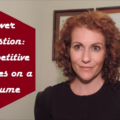You’ve had a great interview for an amazing job, but you haven’t heard back from the company yet. You wait, and wait, and still no feedback. When is it appropriate to follow up? How much is too much follow up? And what should you do while you’re waiting?
Following Up
Before you get to this point, in fact, at the end of your interview, it’s always a good idea to ask the interviewer when you should expect to hear about next steps. This will help you manage your own expectations during the interview process. If you haven’t heard from them in the timeframe indicated, wait a day or two before you send a follow-up email.
If the interviewer wasn’t able to provide you a timeline (or if you forgot to ask at the end of your interview) and you haven’t heard anything in say 10-14 days, then it’s ok to send a quick follow up email to re-iterate your expressed interest and ask if there is any additional information that you can provide them to help in their decision-making.
It is important to remember that the interviewers are likely very busy with conflicting priorities pulling them in different directions. As such, it is imperative that you show your understanding and that you are positive in your messages to the interviewer(s). After all, you don’t want to be thought of as the “high-maintenance” candidate, or the “prima donna” candidate. In doing so, the interviewers may question your business acumen and assume that this is the type of co-worker or employee you could be.
That said, if you find the recruitment process to be unnecessarily long or that you are being treated unfairly, you may want to question if this is a company for which you would want to work. Remember, interviewing is a two-way street, and you are interviewing the company as much as they are interviewing you.
Continue Your Search
Even if you have given the interview of your life for that dream job at one of your target companies, it is important that you don’t lose your job search momentum. It is essential that you continue your job search in the event that something comes up to derail this opportunity and that you have a backup plan in place. Otherwise, if something does happen and the job opportunity is no longer available, but you haven’t maintained our job search, you could find yourself falling behind in your job search. Trying to catch up in finding another opportunity will take that much longer.
Stay Positive
Staying positive during a job search can be challenging, but it is vital to your job search success. When you feel positive, others (including interviewers) will be attracted to your positivity. Here are a few ways in which you can stay positive during your job search:
- Keep in touch with your support network – these are your friends, former colleagues, mentors, and/or family members who encourage you and support you. Lean on them if you need encouragement or simply a break from your grueling job search activities.
- Training – this is a great way to update or keep up to date with the latest tools, technology, and/or skills in your chosen field. Not only is this a great way to keep your skills relevant and employable, you may end up making some great connections that will serve you in your job search now, or during your career in the future.
- Volunteer – this is a wonderful way to leverage your skills to keep them relevant. Much like with training, you may also make some great connections.
- Join a job search networking group – these groups will help you through the challenging times you might be facing or the self-doubt that you might be feeling.
- Take care of yourself – this means eating properly, exercise, and getting a good night’s sleep. This is especially true if you are between successes as it is tempting to sit at home on the sofa and eat junk food. Although this may be a guilty pleasure, it shouldn’t become a new lifestyle. Maintain your healthy eating habits, exercise routine (even if it is simply taking the dog for a walk), and be sure to get a good night sleep.
With the pace of change in business today, anything can happen to delay the recruitment process. It is important to remember to be positive in your follow-up with the interviewer(s), continue your job search, and by all means, stay positive during your job search journey.
If you have any other recommendations, please feel free to leave a comment!
There is a bonus blooper reel at the end of the video, so watch ‘til the end!









